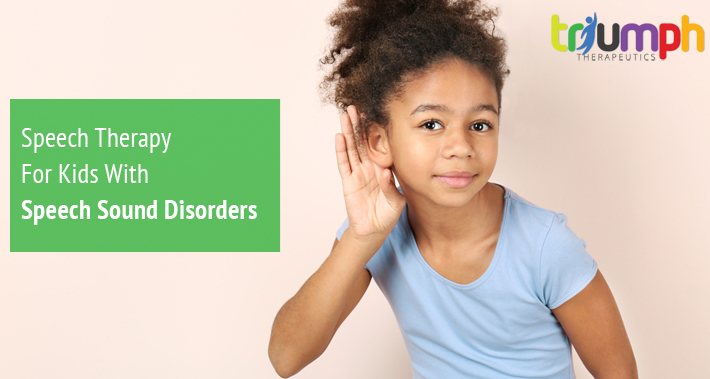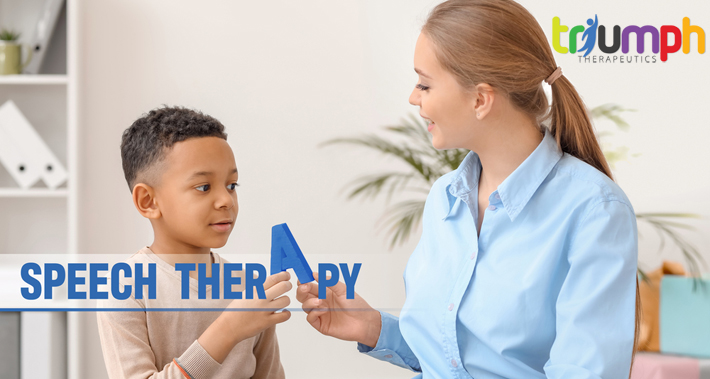Speech Therapy For Kids With Speech Sound Disorders
https://www.triumphtherapeutics.com/wp-content/uploads/2022/06/Triumph-Therapeutics-Speech-Therapy-OT-Physcial-Therapist-Washington-DC-Jun03-01-2022-1.jpg 710 379 Triumph Therapeutics Triumph Therapeutics https://www.triumphtherapeutics.com/wp-content/uploads/2022/06/Triumph-Therapeutics-Speech-Therapy-OT-Physcial-Therapist-Washington-DC-Jun03-01-2022-1.jpgDoes your child miss certain sounds in words?
Do they swap some sounds for others?
If so, they may have a speech sound disorder.
Speech sound disorders can manifest in a number of different ways.
Depending on the type of speech sound disorder and its cause, it can happen when your child is very young or later in their adolescence.
The good news is that speech therapy for kids near me in the Washington DC area can help.
Let’s take a closer look at speech sound disorders – what they are, how they work, and how speech therapy can help.
What Is A Speech Sound Disorder?
A speech sound disorder is a term used to refer to any challenge regarding the perception, motor production, or phonological representation of speech sounds.
There are many different types of speech sound disorders and they each have a variety of unique symptoms associated with each.
They can also be classified as either organic in nature, or functional in nature.
What Causes Speech Sound Disorders?
The cause of speech sound disorders varies depending on their classification.
Organic speech sound disorders are disorders rooted in either the muscles involved in speech, or the part of the brain that controls them.
These include:
- Childhood apraxia of speech
- Dysarthria
- Cleft palate
- Speech issues related to hearing loss
On the other hand, functional speech sound disorders are disorders with no known cause.
These can include articulation disorders and phonological disorders.
But, some risk factors for speech sound disorders have been identified including:
- Being a boy
- The presence of pre or perinatal problems
- A family history of speech or language difficulties
How To Tell If Your Child Has A Speech Sound Disorder?
Some signs that your child might have a speech sound disorder include:
- Omissions or deletions in their speaking like “cu” for “cup”
- Substitutions of one or more sounds like “thing” for “sing”
- Distortions in their general sounds
- Syllable errors where weak syllables are missed like “tephone” for “telephone”
- Additions in their speech like “buhlack” for “black”
Screening For Speech Sound Disorders
If you suspect that your child might have a speech sound disorder, the next step is to book a pediatric therapy evaluation.
Screening usually includes an examination of your child’s speech sounds, oral motor functioning, orofacial structure, and an informal assessment of your child’s language comprehension and production.
The results of this process may indicate:
- A recommendation to monitor and reassess at a later date
- A referral for a comprehensive speech sound assessment
- A referral to an audiologist for a hearing evaluation
- A referral to medical or other professional services
The key here is that if a speech sound disorder is suspected, the comprehensive assessment will be recommended in order to dial in exactly what type of therapy will best benefit your child.
This will also depend on the cause of the speech sound disorder.
If it’s organic, the goal would be first to correct the underlying cause.
If it’s functional, then speech therapy would be the core focus.
How Can Speech Therapy Help?
There are many ways that speech therapy can help if your child has a speech sound disorder.
The first thing any experienced speech therapist will do is evaluate your child to determine what the best course of treatment would be.
This is because it depends on the type of speech sound disorder your child has and their symptoms.
Let’s take a look at some of the approaches your speech therapist might use depending on their assessment of your child.
1. Cycles Approach
The cycles approach targets pattern errors and is effective for children who have highly unintelligible speech and extensive omissions, with some substitutions.
Your child’s treatment cycle can range from five to sixteen week cycles.
Each cycle focuses on stimulating a particular phonological pattern.
Your speech therapist will continue to reuse previous cycles until all of the desired speech patterns are present in your child’s speech.
2. Complexity Approach
Like the name implies, the complexity approach focuses on a complex element not currently in your child’s speaking or sounding ability.
The goal is to encourage the generalized learning of sounds with a variety of complex stimuli that are related to untreated aspects of your child’s speech.
3. Contextual Utilization
The contextual utilization approach highlights the importance of syllable based contexts in connected speech.
The idea is that particular contexts can help your child to produce the correct sounds.
This approach is especially helpful for children who use sounds inconsistently, and need reminders to reinforce the consistent production of that sound in different contexts.
4. Core Vocabulary Approach
A core vocabulary approach is where your child’s speech therapist focuses on whole word production.
This is geared towards children who have inconsistent speech sound production and who may be resisting traditional therapy approaches.
A list of commonly used words is developed and a number of words are selected from this list each week as exercises.
The goal with this approach is for your child to learn their best word production, and create a consistent habit of them using this production.
5. Phonological Contrast
A phonological contract approach is typically used to address phonological error patterns.
The focus here is for your speech therapist to have your child emphasize the sound contrasts required to distinguish one word from another.
For this reason, contrasting pairs are often used.
6. Other Treatment Options
This long list doesn’t include all of the approaches that a speech therapist can use.
Some other treatment options include:
- Distinctive feature therapy
- Metaphon therapy
- Vertical or horizontal approaches
There really is a wide range of strategies available to help your child in the way that will target their particular speech sound disorder best.
Book Your Appointment With Triumph Therapeutics Today
You can see there are a wide variety of strategies your speech therapist can employ to help your child overcome their speech sound disorder.
A good speech therapist will first schedule an evaluation in order to determine a customized treatment plan for your child.
This plan will include the strategies and approaches they think will have the most positive impact on your child’s speech.
To get started, book an appointment with Triumph Therapeutics today.


